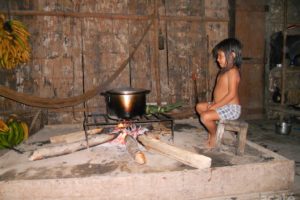
Matsés child watching over traditional method of cooking over wood fire © acaté
At Acaté, each person on our all-volunteer staff and board has experienced the profound majesty of the Amazon Rainforest. We also have had the privilege and honor to work alongside one of the least acculturated remaining tribal groups of the Amazon, the Matsés, or Jaguar people.
Like all indigenous peoples of the world, the Matsés have suffered many hardships and ill-treatment at the hands of Westerners. From rubber barons enslaving them, to petroleros polluting the land and water from which they live, and to carbon-cowboys trying to profit off their land, the indigenous of the Amazon have a strong reason to distrust and resent foreigners.
We are keenly aware of how precarious and sensitive our relationship is with the Matsés. Time and time again, they have been duped and trampled upon; it’s why we’ve taken every step to integrate transparency and honesty in all of our work with the Matsés and other indigenous peoples. By simultaneously raising international awareness of our collective actions impacting these remote destinations, and also providing real programs to help the indigenous of this area, we may lessen our impact on an imperiled environment, its plants, its animals and its people.
Amazonian indigenous under extreme pressures from many fronts
The Matsés communities are under pressures from multiple angles. The petroleum companies want access to oil reserves, the timber industry wants their increasingly rare timber, palm oil producers want their land, gold prospectors want to get rich. In addition, there are people who look at them, not as their fellow brothers and sisters, but as savages in need of Christian doctrine.
Unfortunately, the Matsés are not the only Amazonian group facing increasing pressures to sell out their way of life. Here are three updates of other Amazonian peoples suffering at the hands of their government and foreigners.
Brazilian tribe’s youth committing suicide at alarming rate
The Guarani-Kaiowá, Brazil’s most numerous tribe (numbering at 46,000 people scattered across seven states) has suffered greatly from cattle ranchers and large-scale farmers since first contact, 500-years-ago.
While the anti-indigenous farming lobby in Brazil has repeatedly violated the Guarani-Kaiowá’s rights by using violence, theft and legal action, the people have silently protested by doing the unthinkable: committing suicide.
From ages as young as 9-years-old, the Guarani have lost members of their tribe at the rate of one-per-week for the past century. That figure is on the rise as the youth, disheartened by their detachment from their ancestral lands and lack of upward mobility, are see no other reason to live and see suicide as their only option.
Akin to the tribulations impacting our Native American populations living on reservations in the US, the Guarani reservations are plagued by alcoholism, drug abuse, domestic violence and poverty. The people are living as ghosts, torn from their nature while corporations and farmers ignore their basic human rights.
Highland Amazonian tribe, the Ashaninka, caught in crossfire
The Ashaninka, a tribe historically known for its warrior culture and ability to keep the powerful Incan empire at bay, has finally been ran asunder and struggles to preserve its cultural threads.
Living in poverty amidst illegal logging, cocaine cartels, rebel fighters, and other resource speculators, the Ashanika continue to scrap and fight for their human rights. However, with the increasing presence of the Peruvian Army and the lure of Western modernity, the youth are quickly abandoning the forests and leaving their traditional ways behind.
Within a generation or two, the Ashaninka may become yet another lost tribe, as their elders depart without anyone to communicate their wisdom, traditions, or language.
Isolated tribes like the Mashco-Piro, are risking their health and making contact with outsiders
Traditionally reclusive and hidden, uncontacted and isolated tribes like the Mashco-Piro of Peru are making contact with the outside world asking for supplies like bananas, ropes, and machetes.
Usually completely self-sufficient outside of metal tools, tribal peoples like the Mashco-Piro are making unprecedented contact with modern society in search of basic supplies. This is alarming given their historical reliance and dependency on the forest’s provision for their material and nutritional needs.
This exposure is also of concern due to their genetic vulnerability towards disease and contagions. They are officially protected by Peru’s government for this very reason, and it is why 5.5 million acres are demarcated and outsiders are prohibited from entering to prevent outbreaks of devastating diseases.
The Game: Revealing the Common Thread
These three stories of hardship and despair, and those of the Matsés, all lead back to the same cause: unsustainable resource extraction and consumption with complete disregard to the natural systems and actors dependent on those systems.
We’ve been pitched and sold a game based on competition and consumption. The issue with the current game, or paradigm, is that it’s based on an out-dated mindset that Earth is infinite in its ability to produce resources for our industries and markets.
As globalization has spread, and technology like the internet has exposed, we’re seeing the limits of the current game and it’s becoming harder and harder to avert our eyes as the byproducts of resource extraction and use impact us closer and closer to home.
Communities in the south-western United States are seeing their ground water become polluted or simply dry up from massive underground shale fracking. Drought and fires are increasingly destroying larger swaths of land as we bring down diversity in favor of convenience. Radiation continues to flow forth from the damaged Fukishima nuclear plant.
What we’re experiencing now in our communities is something that has been experienced by the indigenous the world over. Their human rights, livelihoods, and cultures have been destroyed in our mindless and compassionless pursuit of more. We excused our creation of their suffering because they were “less than” or “savages”. Now, as our insulating walls of our bubbles of ignorance begin to pop and dissolve, we must come to terms with our personal responsibility in protecting and nourishing the world, its flora and its fauna.
Changing the Game: It Begins at Home
While we at Acaté are working tirelessly at improving the resiliency and preserving the cultures of the Matsés people, we are also taking account of how our local decisions are impacting those near and afar.
The quickest way to solving a problem is to avoid creating it in the first place. Sure, we can perhaps create the technology to fix mistakes or repair our ignorant damage, but if we shape our culture and perspectives on what it means to live a life of respect, compassion, and consideration, we can stop the problem before it can metastasize and cause pain and misery for those less fortunate, and even ourselves.
There is no magic or green bullet for our current world system’s woes, but there are multiple ways, when used concurrently, that we may alter our cultural crash course. By changing the game’s motives towards better and equitable solutions, we can usher a new wave of prosperity for all, and build a world in which the goal is to make life better, not simply make more of it.
Please enjoy this great video by The Story of Stuff Project and get inspired to see how we may change the game and the goal of life as we collectively agree to see it. Hopefully it can inspire you to find out how you may start shifting the goal of our global game with the actions and decisions you make on a daily basis.
